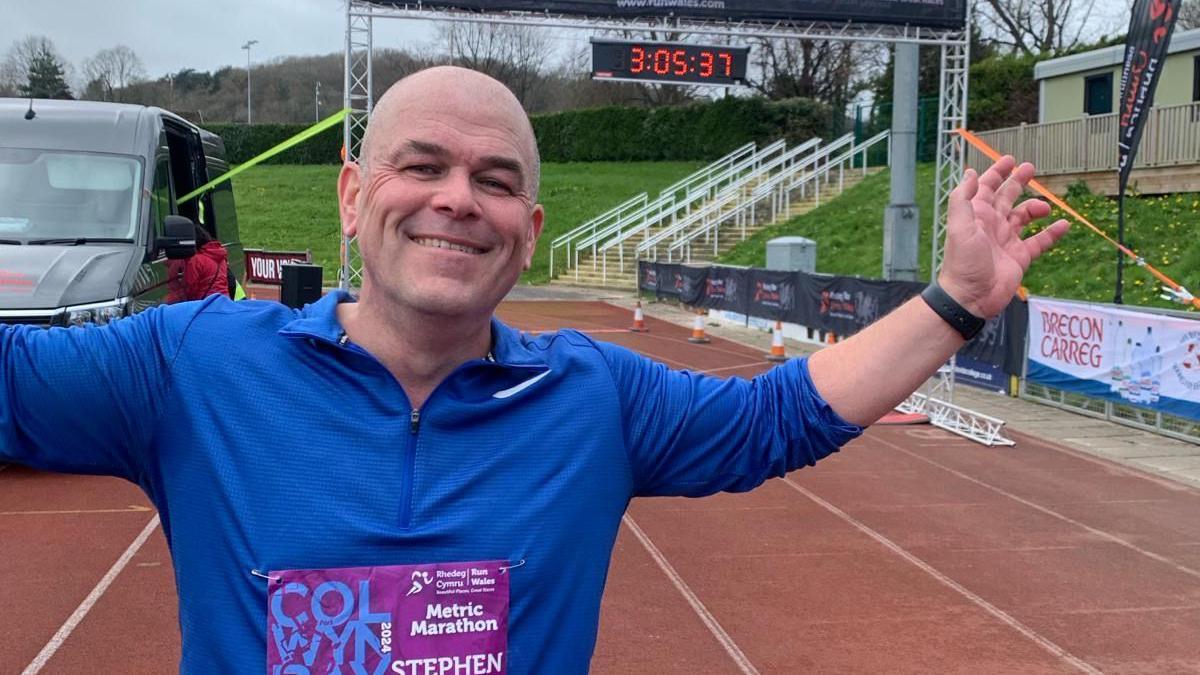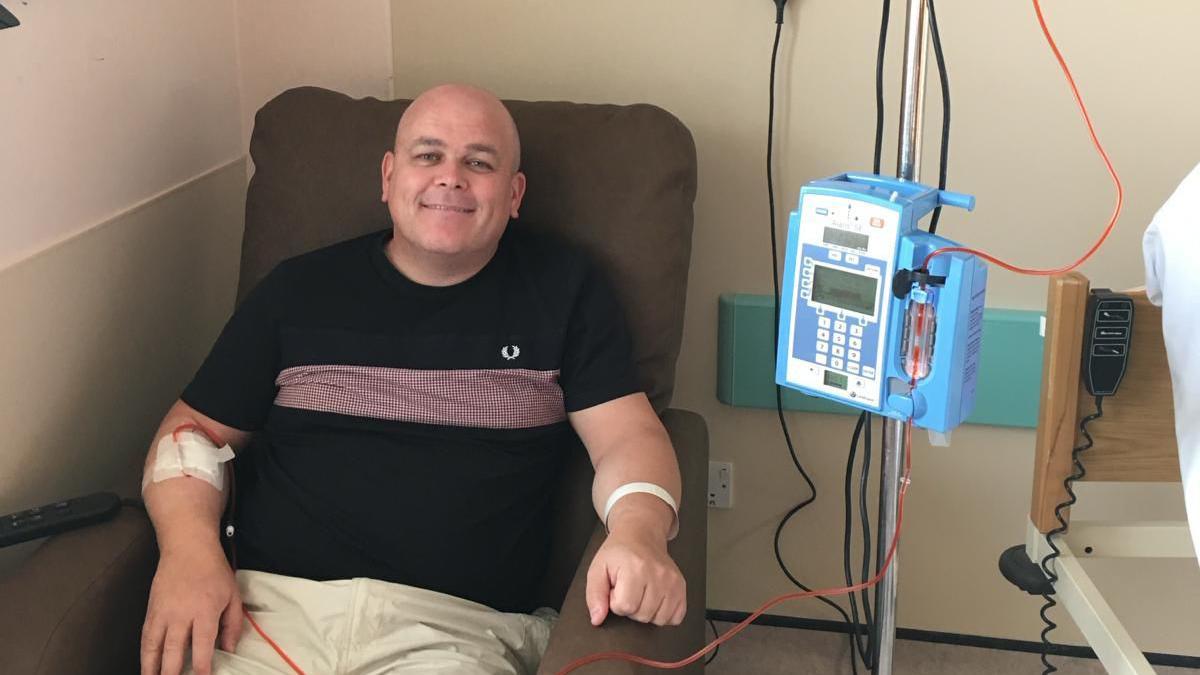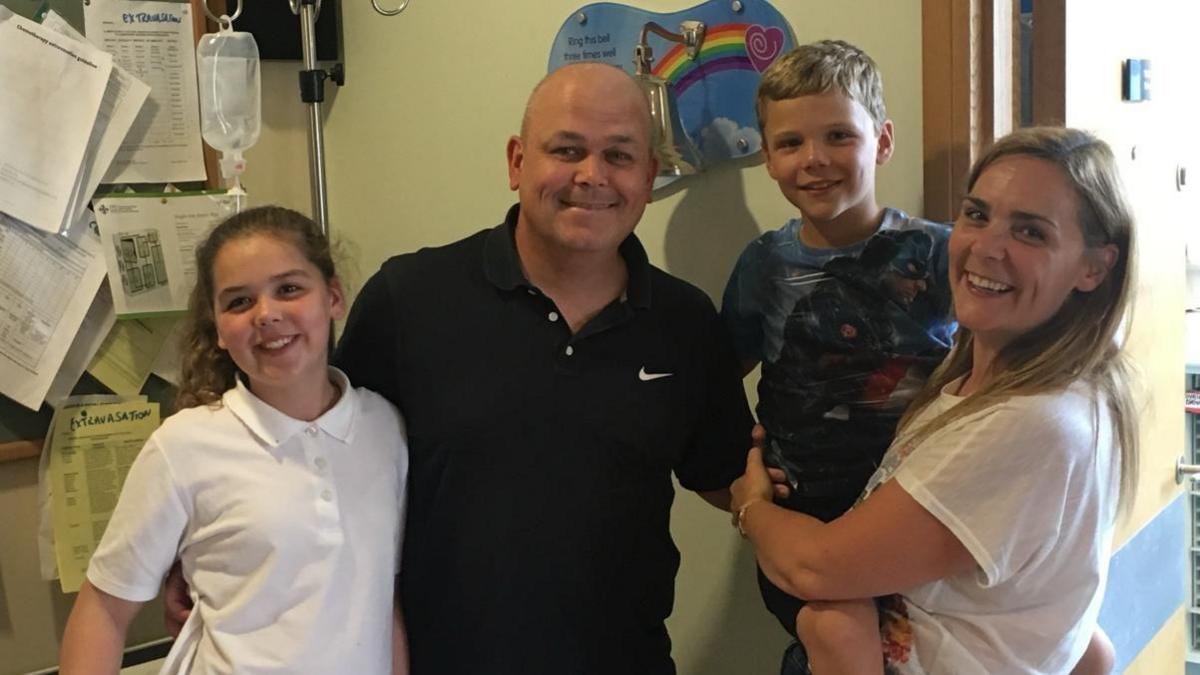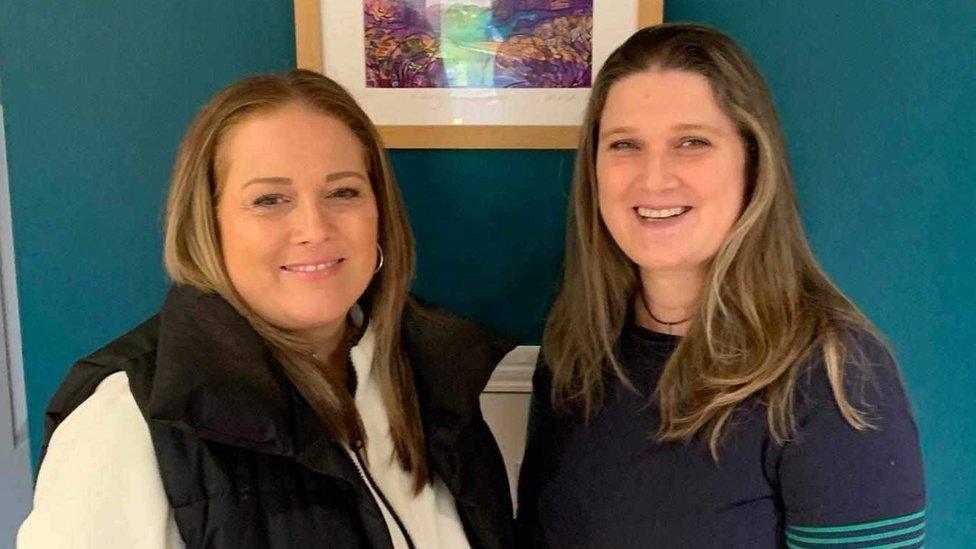Dad to run marathon after leukaemia diagnosis

Stephen has signed up to run the London Marathon following a leukaemia diagnosis in 2017
- Published
A father who went through chemotherapy for leukaemia which left him with "no strength" to walk is running the London Marathon.
Stephen Hughes, from Penrhyn Bay, Conwy, was diagnosed with acute promyelocytic leukaemia, external (APL), a rare type of blood cancer.
The 47-year-old was in hospital for six weeks undergoing "countless" rounds of chemotherapy and multiple blood transfusions.
His treatments were so intensive that he could not walk for more than five minutes without feeling exhausted.
Stephen, who works with the police, starting experiencing back pain in November 2016.
'I overcame anorexia - now I'm running London Marathon'
- Published1 April 2024
Cancer survivor says she was hounded for flat fees. Video, 00:00:42
- Published16 April 2024
William to return to duties after Kate diagnosis
- Published16 April 2024
While he was initially not concerned, the pain started to become more severe over the following months.
During an outing with his wife Catherine, 50, and two children, Elan, 17, and Harri, 14, Stephen said the pain was "horrendous" and he could "barely walk".
After a visit to the doctor, he was advised to go to the A&E department at Ysbyty Gwynedd where he had blood and urine tests.
In April 2017, he was referred to the cancer unit at Glan Clwyd hospital in Denbighshire. It was there that his diagnosis was confirmed.
"Strangely, that morning, I’d woken up with no back pain for the first time in weeks," he said.
"I think I’d convinced myself that the blood was just a side effect of the strong painkillers I’d been taking.
"So when we got to the cancer unit, it suddenly dawned on me that it was something possibly more serious."

Stephen underwent treatment in April 2017 after experiencing back pain "deep inside (his) bones"
That same day Stephen had a bone marrow biopsy taken from the base of his spine.
He remembers the day of his diagnosis as if it was yesterday, as it turned his world "upside down".
"Shock doesn’t cover it really, it was just horrific."
But his first thought was of his two children.
"I was so convinced that I was just going to pop there and get this test to confirm, ‘yes, everything’s fine’, that I didn’t say goodbye properly to the children.
"I thought that I was never going to see them again."
He later found out that his doctor initially did not think he would make it through the weekend.
Stephen stayed in hospital for six weeks, undergoing chemotherapy, blood transfusions and taking up to 25 tablets a day.
'I couldn't do anything'
He started treatment immediately which caused hair loss, nausea and extreme exhaustion.
After being told he was in remission in July 2017, he continued treatment at home for two more months.
Stephen said the treatment made him feel weak, and he could barely walk five minutes away from his house.
"I went for a walk to try and watch my son play football, but by the time I got there, I couldn’t stay, I was just so tired," he said.
Stephen said he only started to process the impact of his diagnosis a few months later when his wife and children had returned to work and school.
He said he struggled with a "feeling of isolation" and frustration.
"Everything seems to be returning to normal, life is returning to normal, and I just felt a million miles from normal.
"When you’re in treatments, and you’re having this chemotherapy, I was making all these promises to myself – if I get through this, then I’m going to be fit, I’m going to be healthy, I’m going to spend more time with the kids."
Stephen said he was left feeling frustrated that he didn't have the energy to live up to the promises he made to himself.
"I couldn’t do anything," he said.

Stephen ringing the bell to mark the end of his treatment with his family
Determined to regain a sense of "normality", he starting going to his local gym, and his fitness and health slowly returned.
Stephen is still having regular check-ups due to the risk of relapse, but he said life had returned to normal again.
In a "moment of madness", he signed up to run the London Marathon for the charity Leukaemia UK.
He said he was "giving it a good shot" and felt fitter and stronger than ever.
Stephen aims to raise £2,000 for the charity, and although he feels nervous, he is determined to cross the finish line.
He hopes that his story will raise awareness and inspire others.
"At the end of the day, it puts everything in perspective that your health is the priority," he said.
"If you’ve got your health, then everything else really is secondary to that."
- Published21 January 2024

- Published11 March 2024

- Published18 February 2024
